|
|
|
Sort Order |
|
|
|
Items / Page
|
|
|
|
|
|
|
| Srl | Item |
| 1 |
ID:
164358
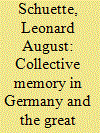

|
|
|
|
|
| Summary/Abstract |
Embedded within the wider normalization–continuity debate about the nature of Germany’s actorness, this article assesses the impact of collective memory on German foreign policy during the European refugee crisis. The Federal Republic’s open-door policy in autumn 2015 bewildered many observers who saw it as a self-harming act of charity. Based on a three-stage empirical framework, the article argues that Germany’s initial behaviour cannot be understood without accounting for the influence that collective memory still exerts in Germany today. The open-door policy was irreconcilable with Germany’s immediate material interests, but instead shaped by collective memory-inspired humanitarian and European principles. This conclusion challenges the growing consensus among students of German foreign policy that Germany is becoming a normal actor which has freed itself from the constraints of the past and behaves in congruence with its material interests. This article seeks to make a timely contribution to the knowledge about collective memory in international relations, Germany’s foreign policy in the specific as well as wider context, and the dynamics of the European refugee crisis.
|
|
|
|
|
|
|
|
|
|
|
|
|
|
|
|
| 2 |
ID:
123127
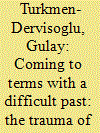

|
|
|
|
|
| Publication |
2013.
|
| Summary/Abstract |
This paper takes as its subject the question of why some nations are less willing to acknowledge past atrocities. To answer that question, it focuses on the assassination of Hrant Dink - a Turkish-Armenian journalist - and its repercussions on Turkish national identity. Scrutinising newspaper articles written before and after the assassination (2004-2007), it casts a detailed glance at the struggle between two carrier groups - pro- and anti-acknowledgement groups - and argues that the assassination increased the likelihood of the acknowledgement of the mass killing of Armenians in 1915 by creating a cultural trauma informed by collective guilt. However, the relief generated by the funeral, combined with the strength of the master commemorative narrative regarding the mass killings, decreased that likelihood, and despite the huge public reaction created by the assassination there was no attempt at acknowledgement. As such, the paper contributes to our understanding of the trauma of perpetrators and claims that, in addition to other factors listed by earlier studies, cultural trauma is a necessary but not a sufficient condition for coming to terms with difficult pasts.
|
|
|
|
|
|
|
|
|
|
|
|
|
|
|
|
| 3 |
ID:
086257
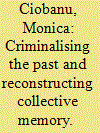

|
|
|
|
|
| Publication |
2009.
|
| Summary/Abstract |
This article analyses the report issued by the Presidential Commission for the Analysis of the Communist Dictatorship in Romania in January 2007 within the context of the politics of memory and justice in post-communist Romania. Crucial aspects of the work of the commission, such as its history and formation, mandate and make-up, methodological and conceptual framework, and the political reactions that it generated are examined. This leads to the conclusion that while the publication of the report brought some progress in revealing the truth, it is less likely to have a similar impact on transitional justice policies.
* A shorter version of this article was presented in October 2007 at the conference 'The Dream Factory of Communism' organised by Havighurst Center for Russian and Post-Soviet Studies at Miami University, Ohio. The field work was funded by the Presidential Research Award and supported by the Institute for Ethics in Public Life at Plattsburgh State University of New York. I would also like to thank Lavinia Stan for her useful comments on an earlier version of the article.
|
|
|
|
|
|
|
|
|
|
|
|
|
|
|
|
| 4 |
ID:
184578
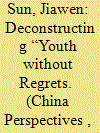

|
|
|
|
|
| Summary/Abstract |
Among the many slogans and descriptive terms concerning educated youth, “youth without regrets” occupies a special place. On the one hand, it is one of the earliest and best-known slogans about educated youth, and even became a cultural symbol of China in the 1990s. On the other hand, its initial association with educated youth and popularity actually reflect not so much a coincidence as a complicity between the popular and state narratives. This article thus analyses in depth the whole range of issues related to the slogan "youth without regrets": the social context and political reasons for its emergence, the process that led to its popularity, its real meaning, and the common misunderstandings surrounding it, as well as the social, cultural, and political functions hidden behind its popularity.
|
|
|
|
|
|
|
|
|
|
|
|
|
|
|
|
| 5 |
ID:
085512


|
|
|
|
|
| Publication |
2008.
|
| Summary/Abstract |
Croatia's foreign policy towards the ICTY and the EU has been marked by ambivalence in the last couple of years. While reluctant to hand over indicated war criminals on the one hand, Croatia has from time to time demonstrated a willingness to fulfill the demands of the international community, and in particular the EU, on the other.
The paper reflects on this seemingly inconsistent behavior and argued that Croatia's foreign policy can be better understood when one takes into account how Croatia remembers its most recent past.
|
|
|
|
|
|
|
|
|
|
|
|
|
|
|
|
| 6 |
ID:
122521
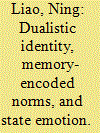

|
|
|
|
|
| Publication |
2013.
|
| Summary/Abstract |
By tracing the origin and evolution of Chinese nationalism, this paper finds that the dialectical relationship between the Chinese "self" and the foreign "other" has provided the cultural-institutional context for the construction of its national identity. The positional change of the Chinese actor in the self-other interaction-resulting from the institutional shift from the tianxia order to the Westphalian system-and the consequent national humiliation have been embedded in the Chinese collective memory and given rise to the consensual norms ingrained in the national identity. Viewed through the lens of political sociology and identity politics, China's tenacious struggle for national rejuvenation can be construed as a social practice guided by these memory-encoded social norms. Due to the protracted and ambivalent nature of the state's purposive action in attaining great-power status on the international stage, the confidence of the resurgent state is compromised by an acute sense of frustration. This identity predicament has engendered a peculiar Chinese state emotion, which has profoundly influenced the in-group members' evaluation and perception of out-group entities and their behavior in the antagonistic intergroup relations.
|
|
|
|
|
|
|
|
|
|
|
|
|
|
|
|
| 7 |
ID:
183764
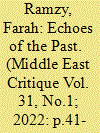

|
|
|
|
|
| Summary/Abstract |
Based on an extensive ethnographic field study among various groups of student activists, this article questions how the memory of historical student protests, namely of 1946 and 1972, is being actualized during student mobilizations after the revolution, especially in the post-2013 repressive context. Focusing on contentious repertoires as the incarnation of memory politics, this article shows how the historical student movement stands for a pool of contentious performances as well as a long standing mnemonic frame of the ‘role’ students should play in society. It then suggests that this past is read through the lens of the ongoing revolution of 2011, and later of the impeding repression. At the same time, the past also weighs in the process of understanding, dealing with and defining one’s place in the present moment whether in terms of actors’ strategies, priorities, ambitions or survival tactics in times of repression. Finally, this article concludes with a preliminary reflection on the potential channels transferring the memory of the student movement, namely, the revolutionary moment, the pre-revolutionary contentious mobilizations, the ‘national historiography’ and Social Media.
|
|
|
|
|
|
|
|
|
|
|
|
|
|
|
|
| 8 |
ID:
141202
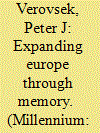

|
|
|
|
|
| Summary/Abstract |
Collective memories of war and suffering have been crucial to the development of European integration since 1945. My basic thesis is that remembrance has also played an important role in the accession of new states to the organization that has come to be known as the European Union (EU). As the EU has expanded into new regions of Europe, particularly the post-dictatorial south and the post-communist east, continental institutions and existing member-states have been confronted by conflicting understandings of the past. Although the past has continued to push states towards membership in the EU, the nature of these remembered experiences has changed through the various rounds of expansion. In addition to tracing the role that memory has played in the widening of Europe, I argue that these confrontations have sparked important debates about the meaning of the past for Europe today.
|
|
|
|
|
|
|
|
|
|
|
|
|
|
|
|
| 9 |
ID:
124160


|
|
|
|
|
| Publication |
2013.
|
| Summary/Abstract |
This article addresses the problem of generational transmission of collective memory in Hong Kong about the 1989 Tiananmen Square incident. It focuses on the young participants in the annual 4 June commemoration rallies and examines the process of mnemonic socialization that brought them into the community of 4 June commemoration. Drawing upon a rally onsite survey and in-depth interviews, this study found that many young people went through a dynamic process of gradual discovery in which various social institutions-school, family and media-played complementary roles. Their understanding of Tiananmen tended to be simplified and essentialized. Yet the loss of details through essentialization has arguably allowed them to uphold a clear-cut moral judgment regarding the event and dismiss certain memory-blurring discourses straightforwardly.
|
|
|
|
|
|
|
|
|
|
|
|
|
|
|
|
| 10 |
ID:
101839
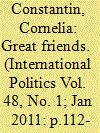

|
|
|
|
|
| Publication |
2011.
|
| Summary/Abstract |
This article highlights the uses of friendship by associations that perpetuate the memory of the Fathers of Europe. It demonstrates that the invention of the tradition of the 'Fathers of Europe' is not the monopoly of European institutions. It was made possible by the mobilization of associations of heirs that have perpetuated these Fathers' memory since the 1960s. From a social history perspective, the article analyzes some case studies that show how associations of friends devoted to the Fathers of Europe have been created, and what kind of activities they have led throughout time. International friendship emerges as a set of reconstructed memories through the practices of the transnational spheres, by transforming a dead friend into an exemplary friend in order to legitimize a certain vision of the European past.
|
|
|
|
|
|
|
|
|
|
|
|
|
|
|
|
| 11 |
ID:
101628
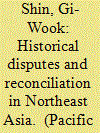

|
|
|
|
|
| Publication |
2010.
|
| Summary/Abstract |
Unhealed wounds from past wrongs, committed during colonialism and war, have created regional animosity and stunted reconciliation in Northeast Asia. Claiming that continued disputes over historical injustice are not solely an intra-Asian issue, this article explores how the US can facilitate historical reconciliation in the region. It is necessary to recognize that the US played a significant role in dealing with historical issues in the aftermath of World War II. Aside from failing to fully address Japanese war crimes in the Tokyo Tribunal, the US was also pivotal in setting the terms of the San Francisco Peace Treaty, a legal instrument that has been the historical precedent for expunging any sense of Japanese guilt and responsibility. Likewise, the US has yet to formally accept its own actions which could be perceived as "crimes against humanity": the US atomic and carpet-bombing of Japanese cities. This article advocates a self-critical, self-reflective approach that would involve US acknowledgement of its own responsibility in handling or mishandling of history issues in Northeast Asia. More specifically, the article also evaluates recent proposals for a presidential visit to Hiroshima or Nagasaki as a means of recognizing the human suffering caused by the atomic bombing, and for a new interpretation of the San Francisco Peace Treaty to better enable victims of Japanese war crimes to air grievances. This article supports both proposals but also argues that they must be implemented with caution and within a larger regional historical framework rather than as an attempt to bolster solely US-Japanese relations.
|
|
|
|
|
|
|
|
|
|
|
|
|
|
|
|
| 12 |
ID:
186080
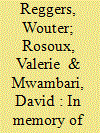

|
|
|
|
|
| Summary/Abstract |
This article explores the interactions between the memories of Belgian peacekeepers killed in the 1994 genocide in Rwanda, the weight of the colonial past, and the Belgian foreign policy. Using interviews with Belgian politicians and diplomats, families of peacekeepers, former blue helmets, as well as a corpus of official speeches, this article finds that the memorialization of blue helmets has influenced Belgian political choices on three levels, namely: domestic politics, its bilateral relationship with Rwanda, and more broadly its position in international peacekeeping. In doing so, this article contributes to interdisciplinary debates on the role of collective memory in domestic and international politics.
|
|
|
|
|
|
|
|
|
|
|
|
|
|
|
|
| 13 |
ID:
172286
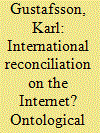

|
|
|
|
|
| Summary/Abstract |
This article explores the Internet’s often touted potential for facilitating reconciliation. It conceptualises Wikipedia as a site for collective memory construction and analyses the Chinese- and Japanese-language entries on the bilaterally contentious Second Sino-Japanese War. It addresses the question of how to make sense of the construction of these online collective memory narratives theoretically. Both historical determinism and instrumentalism – two influential theoretical approaches to collective memory and reconciliation – have great difficulties in fully accounting for this case. Instead, it is argued that ontological security theory is better equipped for understanding collective memory construction in Wikipedia. It is suggested that ontological security seeking can impede efforts for reconciliation even when, as in Wikipedia, there exist norms seeking to promote more neutral narratives. It is argued that a subtle bias in favour of the in-group and against the out-group functions as a mechanism for ontological security management that protects a positive self-identity.
|
|
|
|
|
|
|
|
|
|
|
|
|
|
|
|
| 14 |
ID:
185590


|
|
|
|
|
| Summary/Abstract |
This article analyses how the demolition of the Babri Masjid by Hindu nationalists and the communal violence in its aftermath (1992–93) is remembered in a predominantly Muslim slum neighbourhood in Mumbai. By drawing on ethnographic fieldwork, it considers how a traumatic event is given meaning through fragmented memories inscribed in the urban space. A nuanced analysis of the recollections of the city’s Muslim poor, who faced the main brunt of the violence, suggests that the spatial context of the Muslim neighbourhoods provide a safe social backdrop for the expression of an otherwise suppressed memory that has been pushed by the official narratives of the past into marginality, leading to the creation of an alternative sociality that addresses community concerns to break the hold of the past and imagine a future of peaceful cohabitation.
|
|
|
|
|
|
|
|
|
|
|
|
|
|
|
|
| 15 |
ID:
127844
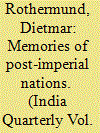

|
|
|
|
|
| Publication |
2014.
|
| Summary/Abstract |
Seven nations lost their colonial empires after the World War II. Italy and Japan had to relinquish their colonies immediately after the war. Great Britain granted independence to India in 1947 and released most of its African colonies in 1960. France and the Netherlands reclaimed their colonies after recovering their sovereignty after the war, but they had to abandon them nevertheless after intense struggles. Belgium shared the same fate. Only Portugal clung to its 'overseas provinces' until 1974 when democratisation and decolonisation coincided. Scholars representing these seven nations met at Heidelberg University in May 2013 to compare notes concerning the post-imperial memories of their nations. The conference was supported by the Robert Bosch Foundation, Stuttgart. The period after decolonisation was characterised by long silences in the post-imperial nations. It is only in recent times that intensive debates of the imperial past and its conflicting memories have been conjured up.
|
|
|
|
|
|
|
|
|
|
|
|
|
|
|
|
| 16 |
ID:
175799
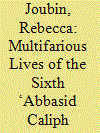

|
|
|
|
|
| Summary/Abstract |
A vast array of narratives found in medieval historical chronicles and literary sources have referenced the particular ways in which the culture associated with the ‘Abbasid caliphate diverged from a binary model of gender. Despite debate about the historical accuracy of these early chronicles, the repeated references to the sixth ‘Abbasid caliph Muhammad al-Amin's non-heteronormativity indicate at least a kernel of truth. This article examines the collective memory construction of al-Amin in the Egyptian series Harun al-Rashid (1997) and two Syrian series, Abna’ al-Rashid: al-Amin wa-l-Ma'mun (The Sons of al-Rashid: al-Amin and al-Ma'mun, 2006) and Harun al-Rashid (2018). These contemporary portrayals of the life of al-Amin simultaneously illustrate the process by which history is altered by authorial perspective and the erasure of nonheteronormative space within the ‘Abbasid caliphate. My own authorial perspective inclines toward an interpretation of al-Amin as queer; through this lens, an inspection of wide-ranging accounts of al-Amin's life reveals the historical biases of his time and our current moment, too, as historians then and now variably recognize al-Amin's queerness in constructing collective memory. Some have argued that anti–al-Amin chroniclers may have engaged in historical revisionism and referred to al-Amin as queer to discredit the caliph, but ultimately, whether or not this is true, the current application of those early references by contemporary screenwriters is the most revealing historiographical decision, as his many representations serve as a mirror for our contemporary subjectivities, interests, and agendas. At a time when queer lives and experiences are notably absent from traditional historical narratives, this article proposes that regardless of the accuracy of the original sources, the absence itself in contemporary portrayals is significant, as patterns of exclusion yield tangible meaning. In this particular case, the ready elimination of queerness from contemporary narratives shows the ways in which queerness is vulnerable to erasure in favor of other, more politically expedient identity characteristics and values.
|
|
|
|
|
|
|
|
|
|
|
|
|
|
|
|
| 17 |
ID:
120362
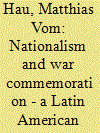

|
|
|
|
|
| Publication |
2013.
|
| Summary/Abstract |
Recent scholarship on collective memory and nationalism in Latin America argues that - in sharp contrast to Europe - war commemoration has been of little importance to the memory work of states in the region. The article challenges this claim. A comparative-historical analysis of school textbooks and school ceremonies in twentieth-century Mexico, Argentina and Peru reveals that the commemoration of major civil and international wars was central to official national narratives in these countries. The article further identifies important qualitative changes in war commemoration over time, especially with respect to how commemorative discourses portrayed agency and assigned responsibility for military victories and losses. These changes are situated within broader transformations of nationalism and new alignments in the politics of nationhood and memory.
|
|
|
|
|
|
|
|
|
|
|
|
|
|
|
|
| 18 |
ID:
189982
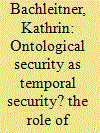

|
|
|
|
|
| Summary/Abstract |
This article explores the link between collective memory and state behaviour in international relations. In that regard, it develops a new concept entitled ‘temporal security’. Building on the existing ontological security literature, it extends a temporal understanding to its underlying identity concept. Countries are now assumed to be temporal-security seekers vis-a-vis a ‘significant historical other’ from their past. Decision makers thus enter into a self-reflective conversation with their country’s ‘collective memory’ when choosing courses of action. Contrasted with existing physical-security and ontological security explanations for state behaviour, the explanatory potential of the temporal-security approach is in a second step illustrated by the empirical case of West Germany and Austria, two former Nazi perpetrator states, and their respective assignments of support during conflict in the Middle East. Through a comparative, qualitative discourse analysis of historical documents during the Six-Day War of 1967 and the Yom Kippur War and oil crisis of 1973, the empirical study finds that West Germany and Austria adopted different courses of action in their international politics, because they looked to Nazi Germany as their significant historical other.
|
|
|
|
|
|
|
|
|
|
|
|
|
|
|
|
| 19 |
ID:
103723


|
|
|
|
|
| Publication |
2011.
|
| Summary/Abstract |
The major historical issue in the Israeli-Arab/Palestinian conflict is the causes for the 1948 Palestinian exodus. Among the Israelis/Jews there are two main narratives regarding this issue: the Zionist one - the refugees fled, for various reasons; and the critical one - some fled while others were expelled by the Jewish/Israeli security forces. This article explores the way the Israeli/Jewish historical memory (i.e. the Israeli/Jewish research community) related to this historical issue from 1949 until 2004. According to the findings, until 1957 this memory exclusively presented the Zionist narrative. However, from 1958 to 1976 this Zionist trend largely continued but was accompanied by considerable critical studies. Later, from 1977 to 2004, this memory was characterized by the almost exclusive adoption of the critical narrative (with major increase in its significance since 1988). These findings contradict the way the literature relates to this memory as almost exclusively Zionist until the late-1980s. Other aspects of this memory are also discussed, such as the explanations for its characteristics, the significance of non-academic scholars, the contribution of scholars who reside externally to the given country, state-research community relations, the influence of present interests on the portrayal of the past, and gender issues. The findings have theoretical implications for collective and historical memories.
|
|
|
|
|
|
|
|
|
|
|
|
|
|
|
|
| 20 |
ID:
188841
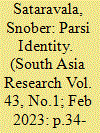

|
|
|
|
|
| Summary/Abstract |
This article discusses the politics of identity and narratives of the Parsi minority community in India, who are Indian Zoroastrians on the brink of extinction. The mapping of the mythical construction of the Parsis by the Parsis themselves is contrasted with representations by popular culture. The main concern is that when there are no more Parsis left in South Asia to participate in this dialogue regarding the manufacture of identity, unchallenged stereotypes will persist, to the disadvantage of the community. Specifically, the character of the mad Parsi (yeda) in Hindi cinema will remain predominant in popular imagination, while narratives of great Parsi entrepreneurs will be absorbed into general narratives of the nation, and collective memory will privilege the queer, the fool, the drug dealer or the anti-Christ.
|
|
|
|
|
|
|
|
|
|
|
|
|
|
|
|
|
|
|
|
|